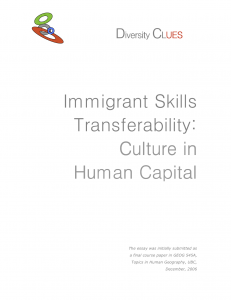Immigrant Skills Transferability: Culture in Human Capital, 2006
This is one of the first studies Olga Shcherbyna conducted while being a student at UBC. In this essay, she challenges the notion of ‘must happen’ complete human capital transferability from one country to another. She argues that cultural capital, immigrants’ ethnic background, socio-economic and political conditions of their home country, their age at immigration, as well as the ‘international value’ of human capital plays a crucial role in determining the degree to which immigrants’ are able to transfer their human capital. Additionally, she explores a notion about how entrance earning might not be a good measurement of the stock of immigrant human capital and, therefore, can not provide a direct explanation for the decreased value of immigrants’ human capital or employers’ discrimination. Finally, she provides a contemporary literature review of possible solutions proposed to update Canadian immigration policy when addressing the issues of skill transferability.
Introduction: At the last SIETAR BC* seminar I attended, Master students from the Department of Electrical and Computer Engineering at UBC delivered a presentation on Global Software Development and Issue of Culture. In the global IT industry, North American organizations outsource offshore, and subcontract software projects to such remote locations as India and China. One of the projects that UBC students researched was one in which Indian software engineers were subcontracted by a Canadian company to develop the software that will be used in Canadian recreational centres. However, when outsourcing the development of this software and saving on cheap labor, the Canadian company did not anticipate facing a ‘little’ problem. Indian engineers did not quite understand the concept of recreational centres as there is no such thing in India. That is one of many examples of how cultural capital might play a strategic role in the development of a product and why the skills of foreign born and trained professionals sometimes are not enough for people to succeed in the Canadian labor market.
Read full paper DiversityCLUES_WhitePaper_Dec06







